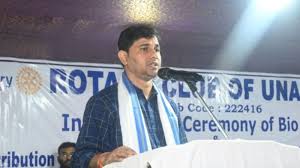‘Speaks for rights of workers’: Tripura CITU head Manik Dey hits back as minister Sudhangshu Das slams Bharat Bandh call

Agartala, July 9 — A political clash over workers’ rights and the nationwide Bharat Bandh call has erupted in Tripura, with senior CPI(M) leader and Centre of Indian Trade Unions (CITU) state president Manik Dey hitting back at state minister Sudhangshu Das for his criticism of the protest movement.
Sudhangshu Das, Tripura’s Minister for Labour and Welfare, had earlier dismissed the Bharat Bandh as a “politically motivated” disruption, accusing Left-backed trade unions of misleading the workers and destabilizing industrial peace in the state. However, Dey fired back on Monday, asserting that CITU has always spoken up for labourers and marginalized sections, and that the bandh is a legitimate form of protest against anti-worker policies.
A Clash of Ideologies
Sudhangshu Das, a BJP leader, accused the bandh organizers of misusing trade union platforms to push a political agenda. Speaking to reporters in Agartala, Das said,
“Tripura is moving forward with job creation, industrial investment, and welfare programs. These bandhs only obstruct progress and confuse our workers. The state government is committed to labour rights, and we do not need disruptive politics.”
Responding sharply, Manik Dey said that such comments reflect an attempt to silence democratic dissent.
“This bandh is not about politics; it’s about people,” Dey said. “When jobs are vanishing, labour laws are being diluted, and social security is under threat, trade unions must act. We are raising the voice of millions of workers who are being ignored.”
What the Bharat Bandh Demands
The Bharat Bandh, supported by several central trade unions across India including CITU, INTUC, and AITUC, is part of a nationwide protest against the alleged dilution of labour protections, rising unemployment, inflation, and privatization of public sector undertakings (PSUs).
The key demands include:
- Rollback of labour code reforms that allegedly dilute worker protections
- Minimum wages for all categories of workers
- Social security for unorganized sector workers
- End to privatization of PSUs and railways
- Better implementation of MNREGA and urban employment schemes
Tripura, which has a strong base of organized labour in sectors such as tea plantations, construction, and transport, saw partial response to the strike. Many shops remained open in urban areas like Agartala, but there was visible participation in rural regions.
Government vs Unions: A Widening Divide
This confrontation is part of a larger trend in Tripura’s politics since the BJP came to power in 2018, dislodging the CPI(M)-led Left Front. Trade unions in the state have often accused the ruling party of trying to weaken organized labour by favoring employers and discouraging union activity.
“Earlier, we had platforms to discuss workers’ issues. Today, there’s only repression. Union leaders are harassed, workers are threatened. And now when we call for a bandh, they call it ‘politics’,” said a local CITU worker from West Tripura.
On the other hand, Minister Das insisted that the government has expanded welfare coverage. “Be it E-Shram registration, Ayushman Bharat health cover, or skill development schemes — we have done more in five years than the Left did in decades,” he claimed.
However, labour activists counter that such schemes are often patchy on the ground, and fail to reach the most vulnerable.
Political Undertones
The exchange between Dey and Das reflects deeper political tensions in Tripura, where the CPI(M) is attempting to rebuild after a major electoral setback. Trade union actions are increasingly being used to reconnect with grassroots support, especially among workers and farmers.
Political analyst Dr. Partha Banerjee from Agartala University says the bandh is a signal that the Left is regaining its confidence.
“CITU remains one of the most organized arms of the CPI(M). With elections approaching in some parts of the state, these mobilizations help the party prepare the ground. At the same time, the BJP is wary of losing its working-class support base, which it cultivated with welfare schemes.”
Mixed Response on the Ground
Reactions to the bandh were mixed. In tea gardens of North Tripura, participation was strong with workers staging gate meetings and marches. In contrast, Agartala’s business community largely stayed away from the strike.
A rickshaw puller near Battala market said,
“I can’t afford to take a day off. But I support the idea — the prices of everything have gone up, and we are struggling.”
Local police reported no major incidents of violence, although some protesters were briefly detained for blocking roads in Khowai and Belonia.
The Road Ahead
As the political dust settles, what remains clear is that the issue of workers’ rights is far from resolved in Tripura. With rising costs of living and shifting labour policies, the space for trade union activism is once again expanding.
Manik Dey summed it up by saying,
“We are not here to please anyone. Our duty is to protect the workers, and we will continue to do that — with or without the government’s approval.”






